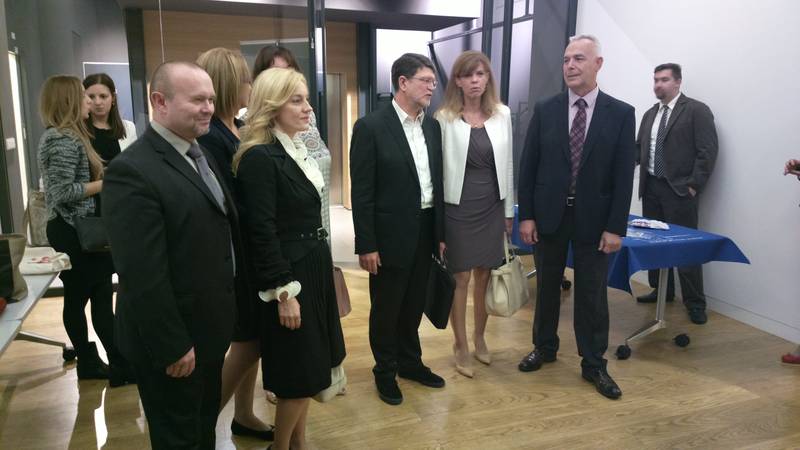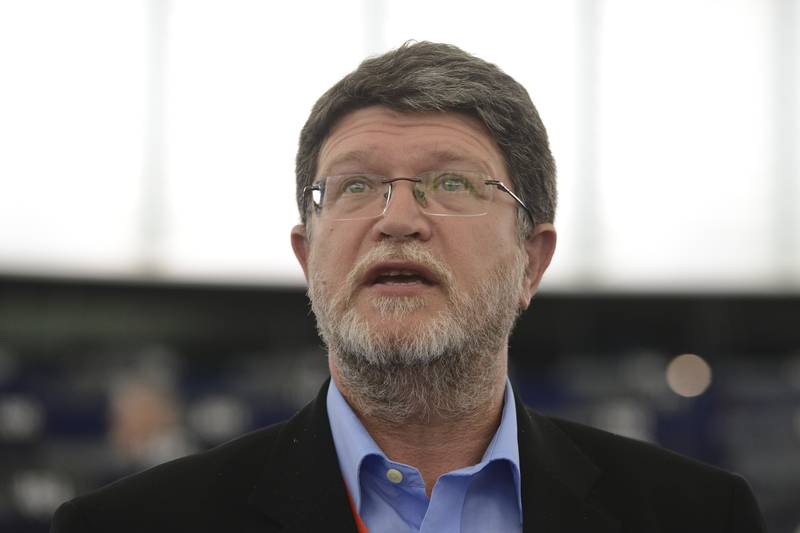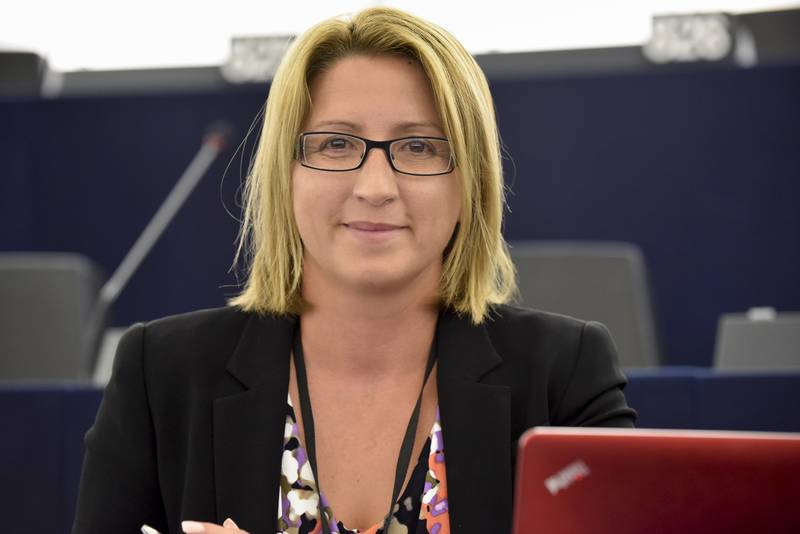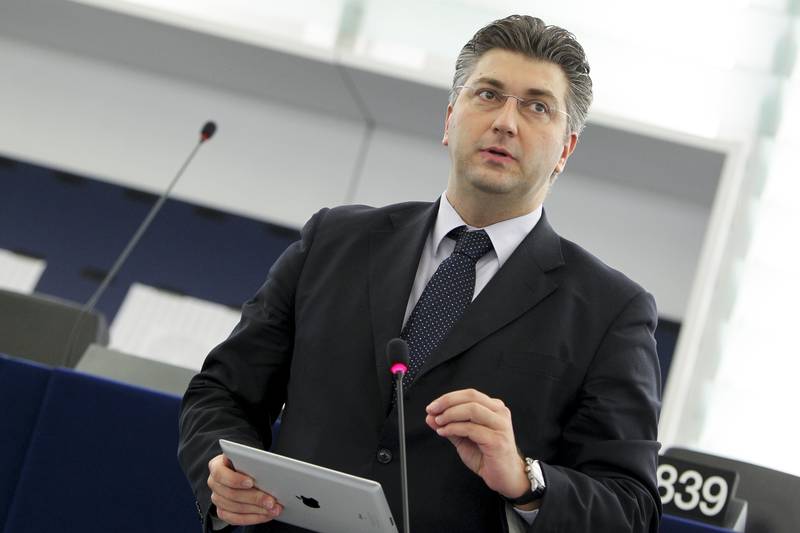Croatian MEPs Do not Want To Take a Hard Stance Against Hungary's Commissioner-designate
Adelina Marini, September 23, 2014
 On 29 September begin the confirmation hearings in the relevant committees of the European Parliament of the members of the new European Commission led by Jean-Claude Juncker. The composition of the Commission, its structure and distribution of portfolios are a result of tough negotiations, lobbying and, finally, a difficult balance. There are attitudes in the European Parliament not to create unneeded obstacles to the approval of the new composition, but there are several candidates who evoke resistance among some individual MEPs. To a large part of the Croatian MEPs a problem is Tibor Navracsics, Hungary's candidate, until recently a minister of foreign affairs. The only member of the economic committee of the European Parliament from Croatia, Ivana Maletic, has issues also with the French candidate - Pierre Moscovici. While to Dubravka Suica a problem is also the choice of Alenka Bratusek, the former Slovene prime minister.
On 29 September begin the confirmation hearings in the relevant committees of the European Parliament of the members of the new European Commission led by Jean-Claude Juncker. The composition of the Commission, its structure and distribution of portfolios are a result of tough negotiations, lobbying and, finally, a difficult balance. There are attitudes in the European Parliament not to create unneeded obstacles to the approval of the new composition, but there are several candidates who evoke resistance among some individual MEPs. To a large part of the Croatian MEPs a problem is Tibor Navracsics, Hungary's candidate, until recently a minister of foreign affairs. The only member of the economic committee of the European Parliament from Croatia, Ivana Maletic, has issues also with the French candidate - Pierre Moscovici. While to Dubravka Suica a problem is also the choice of Alenka Bratusek, the former Slovene prime minister.
He cannot be an Orbanist and a European Commissioner in the same time
Eight out of the eleven Croatian MEPs presented for the first time after the European elections in May their work, distribution in the parliamentary committees and their positions on specific issues. Responding to a question by a journalist of the centre-left daily Novi list from Rijeka, regarding Tibor Navracsics's nomination, most appeared to have mixed feelings. Most categoric was Biljana Borzan (Socialists&Democrats), although she shared she had dilemmas. "I have to admit that I have, indeed, significant dilemmas around Hungary's nomination and I believe that such an individual who backs such positions should not be a commissioner". The problem with the Hungarian candidate is that being part of Viktor Orban's government, he automatically becomes an accomplice and adherent to the Hungarian prime minister's authoritarian positions. The reason why the patience of the MEPs has dried out is Mr Orban's declaring a war against non-governmental organisations.
In spite of the already huge scale of the Hungarian leader's denial of the European values, however, there was no unanimity in the European Parliament this point to be included in the agenda of the plenary session last week. The Liberal group insisted on a hearing and a debate on the situation in Hungary, but it failed to pass the point and held a separate hearing within its group. The lack of determination was evident strongly among the Croatian MEPs, spread into several political groups - EPP, S&D, Liberals and they even have a representative for the first time in the Greens' group.
 Tonino Picula, former foreign affairs minister of Croatia, an eminent politician in the country with ambitions to take over the leadership of the ruling Social Democratic Party said he disagreed with the Hungarian government's policies. "Hungary's policies in the past few years are a proof that even in the EU it is possible retrograde powers to enter influencing on the very foundations the EU is built upon", he said, but urged Mr Navracsics to be given a chance. He received from Jean-Claude Juncker the "Education, Culture, Youth and Citizenship" portfolio. "Let's see if he will confirm these doubts at the hearing and if he really does not respond in an adequate way, then he will not pass and that, of course will put Mr Juncker in a very complicated situation", Mr Picula added. Tibor Navracsics's hearing is scheduled for 1 October in the culture committee of the European Parliament at 1800 (CET).
Tonino Picula, former foreign affairs minister of Croatia, an eminent politician in the country with ambitions to take over the leadership of the ruling Social Democratic Party said he disagreed with the Hungarian government's policies. "Hungary's policies in the past few years are a proof that even in the EU it is possible retrograde powers to enter influencing on the very foundations the EU is built upon", he said, but urged Mr Navracsics to be given a chance. He received from Jean-Claude Juncker the "Education, Culture, Youth and Citizenship" portfolio. "Let's see if he will confirm these doubts at the hearing and if he really does not respond in an adequate way, then he will not pass and that, of course will put Mr Juncker in a very complicated situation", Mr Picula added. Tibor Navracsics's hearing is scheduled for 1 October in the culture committee of the European Parliament at 1800 (CET).
Jozo Rados from the Liberal group was also hard on the issue and recalled that ALDE had proposed a resolution denouncing the Hungarian government's actions against NGOs. But it was not adopted by the other political families and most of all the EPP (part of which is Orban's Fidesz). Mr Rados warned that the Liberals will have a very hard position during Mr Navracsics's hearing. The eminent Croatian MEP Andrej Plenkovic, vice chair of the foreign affairs committee, recalled that after all this is a legal expert, a judge, a professor of European law, former adviser of the Hungarian government, twice a member of parliament, minister of justice and recently a foreign minister. He, too, urged to wait until the hearing.
All the other Croatian members of the European Parliament, especially from the EPP group, held the position "Let's not eliminate no one in advance". Davor Skrlec, from the Greens' group recalled, though, that Navracsics is not the only one who triggered the alarm bell. According to Dubravka Suica (EPP, former mayor of Dubrovnik), Alenka Bratusek is also problematic. She received a key position in the new Commission - a vice president responsible for one of the most sensitive policies in the next five years - the building of an energy union. According to Ms Suica, Alenka Bratusek's nomination is a problem because of her anti-EU statements. "In the EU institutions there is no place for people who do not understand and live according to the European and human values", added Ivana Maletic, recalling that in the economic committee, recently, there was a two-hour debate on the nomination of the former finance minister of France Pierre Moscovici.
Moscovici, too, is a problematic figure
If someone had done a bad job at home, in their own country, how would they do a good job for the rest of the EU, asked Ms Maletic in an interview with this website. The former French finance minister has failed to handle the tough task to fulfil the commitments to reduce the budget deficit, although France had received an extension (the so desired flexibility). He was fired from the government for failing to handle the tasks. There are also concerns in the EU that he comes from France, which has proved to be the Union's "bad boy" under Francois Hollande - it is refusing to do structural reforms, to  comply with the agreed with a lot of pain and under pressure by the financial markets and defaulting one by another member states rules.
comply with the agreed with a lot of pain and under pressure by the financial markets and defaulting one by another member states rules.
In an interview with The Financial Times, Mr Moscovici insisted that he did not join the new Commission in the capacity of a national politician and committed that he would be as tough to France as to any other member state. To him, the existing EU fiscal rules will be his guiding light but he would take as much of advantage as possible of the new existing flexibility. "But flexibility is not indulgence, flexibility is not complacency, flexibility is not weakness. Flexibility cannot be applied to one single country due to one single status", he explained. The new structure of the Commission, though, looks as if Juncker had taken all precautions to tie Mr Moscovici's hands if he were to succumb to his national appeals. Above him are two austerity hawks - Latvia's former Prime Minister Valdis Dombrovskis (EPP), who received the powerful portfolio "Euro and Social Dialogue" and will be responsible for the deepening of the euro area integration, and Finland's former Prime Minister Jyrki Katainen (EPP), who will cover jobs, growth, investments and competitiveness - all of these are areas France has been failing to in the European semester.
Pierre Moscovici admits in his interview with The Financial Times that the three will probably have differences, but they will be overcome as the three will work together on a special paper of the Commission which will clarify the Juncker's Commission stance on "flexibility". The issue is of particular importance to Croatia, as well, which is also under the imbalances and excessive deficit procedure. Because of its big public debt (above 60% of GDP), it is of great importance to the Croatian government how will the debate on flexibility unravel in the EU. Croatia's PM Zoran Milanovic, although from the PES family, is firmly defending (mostly verbally) fiscal discipline, but, for sure, Matteo Renzi's pressure for flexibility would be welcome. Regarding Croatian public finances, Ivana Maletic, who is from the EPP group, also spoke about flexibility.
She recalled that the EPP is definitely for austerity but when it comes to that there are always two elements pointed out: structural reforms and fiscal consolidation go hand in hand with investments. She said also that she has been trying to pass an amendment since last year that introduces a sort of a flexibility in the countries that have a problem with investments. It concerns countries whose gross domestic product is below the EU average and which are included in the excessive deficit procedure and proposes the deficit to be calculated by excluding investments for project co-financed by the EU funds. The Maletic amendment also calls for exclusion of the expenditure on financing projects in the process of their implementation.
However, there should be some conditionality which is to implement structural reforms while working for fiscal consolidation. Something, she admitted, is not being done in Croatia. This entirely falls in the spirit of Mr Renzi's demands for flexibility. How will this be settled in the new Commission's paper is yet to be seen. It is clear, though, that both on the left and right in the European Parliament there are attitudes on behalf of more flexibility. Ivana Maletic believes it is good that Valdis Dombrovskis will be above Moscovici because Mr Dombrovskis "has done a remarkable job in his country". She believes both could actually work rather well. The former finance minister has a different view on economic policy and may be it is good that both are not identical. The decisions will then be taken after arguing and deep consideration, she concluded.
A success for enlargement
All Croatian MEPs are in one way or another committed to the Western Balkans' European integration. Most of them, however, do not see a problem with the new name of the portfolio that affects enlargement - "European Neighbourhood Policy and Enlargement Negotiations". Tonino Picula believes this is the result of a good compromise as in terms of Johannes Hahn's portfolio so in terms of Federica Mogherini's election for EU high representative on foreign policy. "She comes from neighbouring Italy which is why we can rely on a stronger sensitivity when it comes to the Croatian interests in the Adriatic region, but also in Central Europe". Besides, the Italian Ost politik (the eastern policy) is different than Germany's. The former Croatian foreign minister added that Jean-Claude Juncker's words that in the next five years there would be no EU enlargement were wrongly interpreted.
 "Let's be realists. He did not say that there would not be enlargement in the next five years, but which country will be ready even in more than five years to join the EU? I think none. So, this was a sentence that rather echoed within the EU than aimed to discourage the efforts in the east. I believe, Ms Mogherini will support the ambitions of the countries in the Balkans", Mr Picula concluded. Andrej Plenkovic, too, did not seem worried. According to him, it is "excellent" that the enlargement is explicitly mentioned. He also liked the fact that Johannes Hahn was selected for the post because he knows the region very well. Mr Plenkovic expects Mr Hahn to work well with the European Parliament and Croatia in particular. Asked by euinside if it is not, after all, a bad news that the new portfolio will affect only the accession negotiations which automatically excludes Macedonia and Bosnia and Herzegovina, he said there were no reasons to worry.
"Let's be realists. He did not say that there would not be enlargement in the next five years, but which country will be ready even in more than five years to join the EU? I think none. So, this was a sentence that rather echoed within the EU than aimed to discourage the efforts in the east. I believe, Ms Mogherini will support the ambitions of the countries in the Balkans", Mr Picula concluded. Andrej Plenkovic, too, did not seem worried. According to him, it is "excellent" that the enlargement is explicitly mentioned. He also liked the fact that Johannes Hahn was selected for the post because he knows the region very well. Mr Plenkovic expects Mr Hahn to work well with the European Parliament and Croatia in particular. Asked by euinside if it is not, after all, a bad news that the new portfolio will affect only the accession negotiations which automatically excludes Macedonia and Bosnia and Herzegovina, he said there were no reasons to worry.
Pierre Moscovici's hearing is scheduled for 2 October at 0900 (CET) in the economic committee with live updates by euinside. Johannes Hahn will appear in the foreign affairs committee on 30 September at 1330 (CET), again, with live updates. Federica Mogherini's hearing will be on 6 October at 1830 in the foreign affairs committee. She already appeared in the beginning of the new season before the committee, but in a different capacity - as a representative of the Italian presidency. Nonetheless, she left the Croatian MEPs with very good impression. According to vice chair Plenkovic, she is young and energetic, speaks fluently several languages and is likely to receive support at the hearing.
 Kolinda Grabar-Kitarovic | © KGK
Kolinda Grabar-Kitarovic | © KGK Jozo Rados | © European Parliament
Jozo Rados | © European Parliament Aleksandar Vucic, Andrej Plenkovic | © Vlada RH
Aleksandar Vucic, Andrej Plenkovic | © Vlada RH